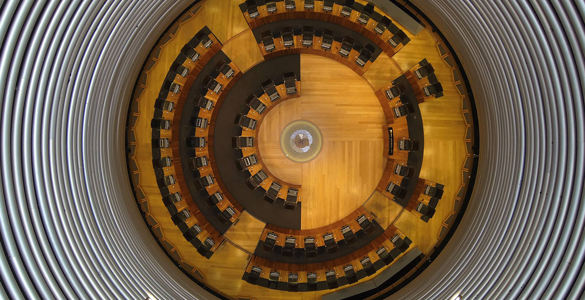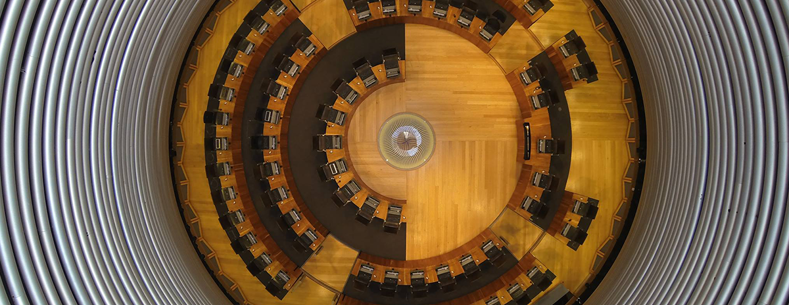Like many organisations, the Senedd has had to change the way it works during the coronavirus pandemic. This blog post looks at changes to Senedd procedure and practice during this period. It also compares the response of the Senedd with those of other legislatures in the UK.
Virtual Plenary
The Senedd became the first of the UK’s legislatures to hold a formal virtual meeting on 1 April. Sixteen Members of the Senedd took part, with a recording of the meeting made available shortly afterward. Four more virtual Plenary meetings have since been held, broadcast live and with up to 28 Members each time.
The Senedd did not have to change Standing Orders - the rules that govern how it operates - to start meeting remotely, as the Senedd is not required to meet in any particular place. However, the Senedd did make changes to Standing Orders to make it easier to hold both socially distanced physical meetings and virtual meetings. These changes were proposed by the Business Committee – the group that organises Senedd business, made up of party business managers (or whips) and chaired by the Llywydd (Presiding Officer). On the recommendation of the Business Committee, the Senedd agreed that the Llywydd could, where required for public health reasons:
- Determine that a vote is not valid unless at least 4 Members participate, and those Members represent more than one political group, after consulting the Business Committee. Otherwise, a vote is not valid unless at least ten Members participate.
- Determine that each political group may nominate one Member of the group to carry the same number of votes as there are members of the group. This is known as weighted voting. The Senedd used weighted voting for the first time in the Local Government Bill debate on 8 April.
- Summon the Senedd to consider an urgent public health matter, with the agreement of the Business Committee. Normally, the Presiding Officer can only summon the Senedd if no meeting is scheduled at the request of the First Minister.
- Exclude members of the public from attending Plenary. Broadcast access must continue unless the Senedd Commission deems it impractical. The Commission has decided to close the Senedd estate to the public and suspended face-to-face events including Senedd proceedings until 31 May.
The Senedd also voted to create the post of designated temporary Presiding Officer and Acting Chair, electing David Melding AM to the post. The Senedd agreed on 24 March to consolidate these and other temporary measures (addressed below) into a new Standing Order 34. Standing Order 34 ceases to have effect when the Senedd is dissolved or when the Senedd decides it should, whichever is sooner.
[table id=12 /]
Other legislatures in the UK have also begun to meet entirely or partly online. The Scottish Parliament has held both socially distanced physical meetings and virtual questions for MSPs and party leaders. The Presiding Officer has now said that all MSPs will be able to participate in a virtual meeting by 7 May. On 21 April, the House of Commons approved proposals for ‘hybrid proceedings’. These allow up to 120 MPs to participate in proceedings virtually and 50 more to participate physically. The House of Lords met fully remotely for the first time on the same day. The Northern Ireland Assembly continues to meet physically, with a maximum of 22 MLAs in the Stormont chamber.
The Senedd has held its virtual meetings via a licensed version of the videoconferencing app Zoom. The House of Commons has also used Zoom. On 3 April, the Clerk of the House of Commons said that MPs would be offered licences for a ‘parliamentary version of Zoom’. He explained it had not been made available sooner because the Parliamentary Digital Service needed to ensure that their version met ‘legal, security and privacy requirements.’ The House of Lords initially used Microsoft Teams, before moving to Zoom.
Plenary: Business as usual?
In a normal week, the Senedd carries out a range of business in Plenary meetings on Tuesdays and Wednesdays. This includes statements, questions and government and non-government debates as well as legislation. In the virtual meetings on Wednesdays in April the Senedd undertook a more limited range of business than normal, hearing Government statements on the coronavirus pandemic, considering one Bill at stage one, and voting to approve the Welsh Government’s coronavirus restrictions regulations. Making these changes to Senedd business required changes to procedure.
On 17 March, the Senedd’s Business Committee agreed to postpone almost all non-government business for the foreseeable future. The Government also agreed to postpone most of its business to focus on the coronavirus response. The Senedd then made changes to Standing Orders to relax rules on business. On the recommendation of the Business Committee, the Senedd voted to enable the Presiding Officer to disapply the requirements in Standing Orders for First Minister’s Questions, oral questions to Ministers and questions to the Senedd Commission. Topical questions – oral questions without notice - are resumed from 6 May. In addition, the Llywydd has exercised her discretion to limit the number of Written Senedd Questions per Member to ten each week.
Other legislatures in the UK have also made changes to business as they have moved fully or partly online. On 21 April, the House of Commons approved temporary proposals for MPs to hold Prime Minister’s Questions, urgent questions and statements as hybrid proceedings. The following day, MPs approved proposals to extend hybrid business to motions and legislation and to allow electronic voting. The House of Lords is holding some business remotely, but continues to hold debates on legislation physically: it cannot make decisions in virtual proceedings as there is no Mace present. Although the Scottish Parliament has so far only held questions remotely, it has now made temporary changes to its Standing Orders to allow remote voting.
Passing legislation
Passing legislation is a key part of Senedd business. The Senedd normally considers primary legislation in four stages, through Plenary and committees.
The Welsh Government brought the stage one debate on the general principles of the Local Government and Elections (Wales) Bill to the virtual Plenary meeting on 8 April. Representatives of party groups voted on whether to approve the general principles of the Bill. No amendments can be tabled at stage one. On 27 April, Business Committee agreed to a temporary suspension of Stage 2 proceedings, including no tabling of amendments At the same time, the Government has been reviewing which Bills it wants to progress before the next Senedd election in May 2021. It has decided that the Local Government and Elections (Wales) Bill and the Curriculum and Assessment Bill are priorities.
As well as dealing with primary legislation, the Senedd also must scrutinise subordinate legislation. This is legislation made by Welsh Ministers under the powers granted in primary legislation. Normally, the Legislation, Justice and Constitution (LJC) Committee is responsible for considering subordinate legislation before it is voted on, if necessary, by the Senedd. Following the suspension of committee meetings, the Senedd approved changes to Standing Orders to remove the LJC Committee’s formal responsibilities in this area, while ensuring that Members continued to receive advice on subordinate legislation. The LJC Committee took up responsibility for subordinate legislation again when committee activity resumed.
The Government has said that it will need to make secondary legislation to tackle the coronavirus pandemic. A number of regulations have now been made. In some cases, these regulations require the approval of the Senedd. For example, the Senedd had to approve the regulations that impose the coronavirus lockdown within a set period or they would have ceased to have effect. The regulations were approved in Plenary on 29 April. The Government has also said ‘a significant volume of priority subordinate legislation’ will be needed to prepare for the end of the Brexit transition period on 31 December.
The Senedd is also responsible for considering whether to grant consent to UK legislation that affects devolved powers. The Welsh Government has laid Legislative Consent Memorandums before the Senedd on several UK Bills. The First Minister has said that the Welsh Government aims to ensure that the Senedd can still vote on legislative consent motions and that it would ‘recommend the usual scrutiny periods where the UK Parliamentary timetable permits’. In some cases, the UK Parliament has suspended proceedings on Bills in devolved areas due to the pandemic and the Senedd’s Business Committee has agreed to extend deadlines for scrutiny.
Committees
Committees perform a range of important roles, including questioning Ministers, holding inquiries and scrutinising legislation. The Senedd normally holds more than ten committee meetings each week during term time. On 23 March, the Business Committee agreed that committees would not meet because of the pandemic on 23 March. After the trial of virtual Plenary meetings, committees resumed meeting on 29 April. At present, there is capacity for four public (broadcasted) committee meetings to be held each week; that number is expected to increase. The Senedd has agreed changes to Standing Orders enabling committee chairs to relax public access requirements for formal meetings. Committees can also undertake some activity in private, such as evidence gathering and issuing correspondence.
Other legislatures have approached this issue in different ways. House of Commons committees continued to hold formal virtual meetings during Easter Recess after voting to relax rules on remote meetings. The House of Commons has said it now expects to be able to support up to 20 committee meetings each week, while the House of Lords is also holding virtual committee meetings. The Scottish Parliament approved temporary changes to Standing Orders to allow committees to meet remotely on 21 April. The Presiding Officer has confirmed that the Scottish Parliament will now be able to support 16 virtual committee and Plenary meetings each week. The Scottish Parliament and the House of Lords are establishing temporary coronavirus committees, while the Northern Ireland Assembly has established a temporary committee of all MLAs on the coronavirus response.
Article by Lucy Valsamidis, Senedd Research, Welsh Parliament
We’ve published a range of material on the coronavirus pandemic, including a post setting out the help and guidance available for people in Wales and a timeline of Welsh and UK governments’ response.
You can see all our coronavirus-related publications by clicking here. All are updated regularly.






